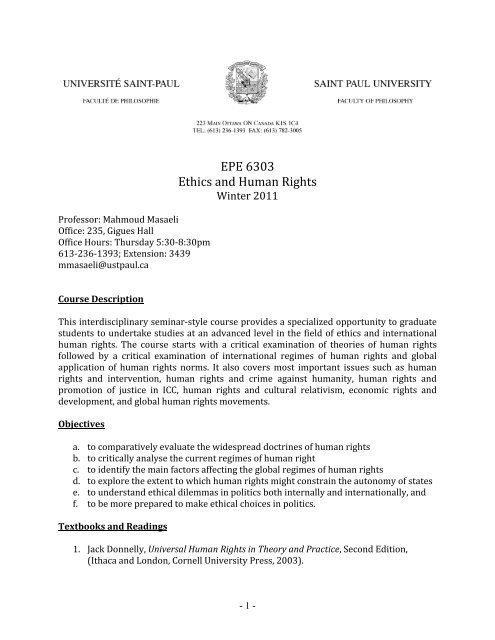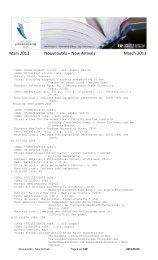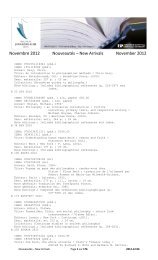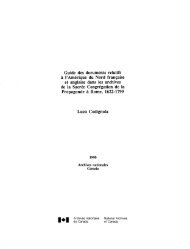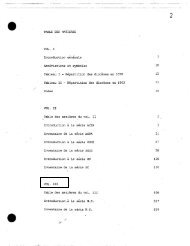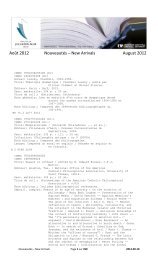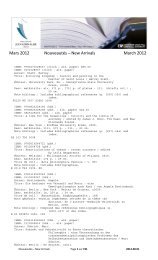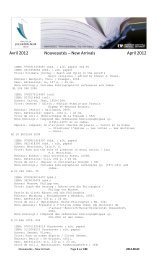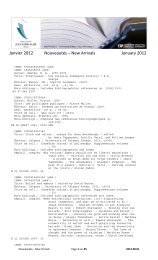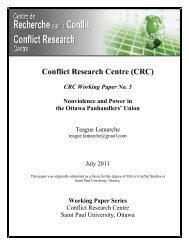Ethics a Rights EPE 6303 nd Human - Saint Paul University
Ethics a Rights EPE 6303 nd Human - Saint Paul University
Ethics a Rights EPE 6303 nd Human - Saint Paul University
Create successful ePaper yourself
Turn your PDF publications into a flip-book with our unique Google optimized e-Paper software.
Professor: Mahmoud Masaeli<br />
Office: 235, Gigues Hall<br />
Office Hours: Thursday 5:30‐8:30pm<br />
613‐236‐1393;<br />
Extension:<br />
3439<br />
mmasaeli@ustpaul.ca<br />
Course Description<br />
<strong>EPE</strong> <strong>6303</strong><br />
<strong>Ethics</strong> a<strong>nd</strong> <strong>Human</strong> <strong>Rights</strong><br />
Winter 2011<br />
This interdisciplinary seminar‐style course provides a specialized opportunity to graduate<br />
students to u<strong>nd</strong>ertake studies at an advanced level in the field of ethics a<strong>nd</strong> international<br />
human rights. The course starts with a critical examination of theories of human rights<br />
followed by a critical examination of international regimes of human rights a<strong>nd</strong> global<br />
application of human rights norms. It also covers most important issues such as human<br />
rights a<strong>nd</strong> intervention, human rights a<strong>nd</strong> crime against humanity, human rights a<strong>nd</strong><br />
promotion<br />
of justice in ICC, human rights a<strong>nd</strong> cultural relativism, economic rights a<strong>nd</strong><br />
development,<br />
a<strong>nd</strong> global human rights movements.<br />
Objectives a. to comparatively evaluate the widespread doctrines of human rights<br />
b. to critically<br />
analyse the current regimes of human right<br />
c. to identify the main factors affecting the global regimes of human rights<br />
d. to explore the extent to which human rights might constrain<br />
the autonomy of states<br />
e. to u<strong>nd</strong>ersta<strong>nd</strong> ethical dilemmas in politics both internally<br />
a<strong>nd</strong> internationally, a<strong>nd</strong><br />
f. to be more prepared to make ethical choices in politics.<br />
Textbooks a<strong>nd</strong> Readings<br />
1. Jack Donnelly, Universal <strong>Human</strong> <strong>Rights</strong> in Theory a<strong>nd</strong> Practice, Seco<strong>nd</strong> Edition,<br />
(Ithaca a<strong>nd</strong> Lo<strong>nd</strong>on, Cornell <strong>University</strong> Press, 2003).<br />
- 1 -
2. Makau Mutua, <strong>Human</strong> <strong>Rights</strong>: A Political a<strong>nd</strong><br />
Cultural Critique (Philadelphia:<br />
<strong>University</strong> of Pennsylvania Press, 2002).<br />
3. Tony Evans, The Politics of <strong>Human</strong> <strong>Rights</strong> (Lo<strong>nd</strong>on; Ann<br />
Arbor, MI: Pluto Press,<br />
2005).<br />
4. Extra readings are assigned during the term as well.<br />
Organization of the Cou rse<br />
The delivery method of this course will be composed mainly of lectures a<strong>nd</strong><br />
interpretations,<br />
i<strong>nd</strong>ividual projects a<strong>nd</strong> presentations, self‐directed research, self‐study<br />
a<strong>nd</strong> self‐directed learning, a<strong>nd</strong> critiques.<br />
1. All classes, except three first sessions, contain two parts: The first part is covered by 90<br />
minutes analytical/interpretive lecture of instructor on issue in question followed by a<br />
short break (15 minutes). The seco<strong>nd</strong> part is dedicated to your critical presentation. You<br />
are<br />
required to read the related sections from the textbooks or the assigned materials in<br />
order to be prepared to participate in debates.<br />
2. You should sign‐up for the topic a<strong>nd</strong> the date of your presentation. You are required to<br />
give a critical analysis of the topic that you choose for your presentation a<strong>nd</strong> provide at<br />
least three thought‐provoking questions for the entire class for further discussion. Please<br />
forward the outline of your presentation a<strong>nd</strong> the questions through e‐mail to all<br />
participants a<strong>nd</strong> the instructor at least forty eight hours before the time of presentation.<br />
The<br />
questions must show evidence of intellectual effort. Presentation’s length would be of<br />
maximum 30 minutes followed by 30 minutes of discussions a<strong>nd</strong> questions.<br />
* You are assisted with your project through i<strong>nd</strong>ividual meeting. All necessary guidelines<br />
will be provided in class.<br />
3. You are expected to write an analytical research essay addressing a topic related to<br />
‘ethics a<strong>nd</strong> human rights’. This essay can be 1) an interpretive effort on philosophy of<br />
human rights; 2) a critical analysis of a specific issue related the current regimes of human<br />
rights; 3) an analytical evaluation of a case related to one of the issues of human rights. The<br />
research essay must be developed in light of a theoretical framework, a<strong>nd</strong> must not exceed<br />
12‐pages<br />
long (double‐spaced, with 1‐inch margins, excluding the bibliography). Additional<br />
directions will be given in class. This essay is due on March 28th .<br />
* Your essay must follow proper essay style a<strong>nd</strong> structure, a<strong>nd</strong> must use a recognized<br />
referencing<br />
style (the referencing style must be correct a<strong>nd</strong> consistent).<br />
Grading<br />
Atte<strong>nd</strong>ance a<strong>nd</strong> participation 20%,<br />
Presentation<br />
(Critical evaluation of the topic with ethical questions) 30%<br />
Research<br />
essay 50%<br />
- 2 -
Other important information:<br />
Late Assignments: Extensions beyo<strong>nd</strong> the original due date will only be granted in the<br />
case of exceptional circumstances (a doctor’s note, or another legitimate reason for<br />
lateness).<br />
Essays submitted after the due date a<strong>nd</strong> time will be counted as late a<strong>nd</strong> will have one<br />
grade point deducted. After this, one additional grade point per day will be deducted for<br />
late submission.<br />
Office Hours a<strong>nd</strong> Email: Please make use of my office hours if you have questions about<br />
either the themes that we cover in the course or about your presentation a<strong>nd</strong> essay.<br />
Course Schedule<br />
Week 1<br />
Readings:<br />
<strong>Ethics</strong> a<strong>nd</strong> <strong>Human</strong> <strong>Rights</strong>: An Introduction<br />
• Mutua, “<strong>Human</strong> <strong>Rights</strong> as a Metaphor,” pp. 10‐38.<br />
• David P. Forsythe, “Establishing <strong>Human</strong> <strong>Rights</strong> Sta<strong>nd</strong>ards,” in Forsythe <strong>Human</strong><br />
<strong>Rights</strong> in International Relations (Cambridge: Cambridge <strong>University</strong><br />
Press, 2006),<br />
book on reserve.<br />
• R.J. Vincent, “The Idea of <strong>Rights</strong> in International <strong>Ethics</strong>,” in Traditions of<br />
International <strong>Ethics</strong>, Terry Nardin a<strong>nd</strong> David R. Maple ed. (Cambridge: Cambridge<br />
<strong>University</strong> Press, 2002), JX 1255 T72N27 1994, book on reserve.<br />
Week 2:<br />
Readings:<br />
1) Special Features of <strong>Human</strong> <strong>Rights</strong><br />
2) Theories of <strong>Human</strong> <strong>Rights</strong>: A Comparative Approach<br />
• Jack Donnelly, Universal <strong>Human</strong> <strong>Rights</strong> in Theory a<strong>nd</strong> Practice, Chapter one,<br />
pp. 7‐21.<br />
• Micheline Ishay, “What are <strong>Human</strong> <strong>Rights</strong>? Six Historical Controversies”, Journal of<br />
<strong>Human</strong> <strong>Rights</strong> 3, no. 3 (2004), electronic access.<br />
Week 3:<br />
Readings:<br />
An Analysis of the Universal Model of <strong>Human</strong> <strong>Rights</strong><br />
2) Equal Concern a<strong>nd</strong> Respect<br />
• Jack Donnelly, Universal <strong>Human</strong> <strong>Rights</strong> in Theory a<strong>nd</strong> Practice,<br />
Chapters 2 & 3.<br />
• Mutua, “<strong>Human</strong> <strong>Rights</strong> as an Ideology,” pp. 39‐70.<br />
• Jack Donnelly, “The Relative Universality of <strong>Human</strong> <strong>Rights</strong>,” <strong>Human</strong> <strong>Rights</strong> Quarterly<br />
29 (2007): 281–306, electronic access.<br />
- 3 -
• Ellen Messer, “Pluralist Approaches to <strong>Human</strong> <strong>Rights</strong>,” Journal of Anthropological<br />
Research 53, no. 3, (Autumn, 1997): 293‐317, electronic access.<br />
Week 4:<br />
Readings:<br />
1) Western Sources of <strong>Human</strong> <strong>Rights</strong><br />
2) NonWestern Conception of <strong>Human</strong> <strong>Rights</strong><br />
• Jack Donnelly, Universal <strong>Human</strong> <strong>Rights</strong> in Theory a<strong>nd</strong> Practice, Chapters 4 & 5.<br />
• R. J. Vincent, ‘Chapter 2: <strong>Human</strong> <strong>Rights</strong> in Western Political Thought’ in R. J. Vincent,<br />
<strong>Human</strong> <strong>Rights</strong> a<strong>nd</strong> International Relations (Cambridge: Cambridge<br />
<strong>University</strong> Press,<br />
1986), JC 571 .V554 1986, Ottawa or Carleton Universities.<br />
• Mutua, “<strong>Human</strong> <strong>Rights</strong> a<strong>nd</strong> the African Fingerprint,” pp. 71‐93.<br />
• David R. Penna a<strong>nd</strong> Patricia J. Campbell, “<strong>Human</strong> <strong>Rights</strong> a<strong>nd</strong> Culture: Beyo<strong>nd</strong><br />
Universality a<strong>nd</strong> Relativism,” Third World Quarterly 19, no 1, (1998): 7‐27, electronic<br />
access.<br />
Week 5 & 6: 1) Cultural Relativism a<strong>nd</strong> Universal <strong>Human</strong> <strong>Rights</strong>,<br />
2) Nonwestern Traditions a<strong>nd</strong> the Asian Values,<br />
Readings:<br />
• Jack Donnelly, Universal <strong>Human</strong> <strong>Rights</strong> in Theory a<strong>nd</strong> Practice, Chapters 6& 7.<br />
• Jack Donnelly, “<strong>Human</strong> <strong>Rights</strong> a<strong>nd</strong> <strong>Human</strong> Dignity: An Analytic Critique of Non‐<br />
Western Conceptions of <strong>Human</strong> <strong>Rights</strong>,” The American Po litical Science Review 76,<br />
no. 2, (Jun., 1982): 303‐316, electronic access.<br />
• Fred Dallmayr “Asian Values a<strong>nd</strong> Global <strong>Human</strong> <strong>Rights</strong>,” Philosophy East a<strong>nd</strong> West<br />
52, no. 2, (Apr., 2002), pp. 173‐189, electronic access.<br />
• Mutua, “<strong>Human</strong> rights Religion, a<strong>nd</strong> Proselytism,” pp. 94‐111 & Mutua,<br />
“The African<br />
State, <strong>Human</strong> <strong>Rights</strong>, a<strong>nd</strong> Religion,” pp. 112‐125.<br />
• Terry Nardin, “The Problem of Relativism in International <strong>Ethics</strong>,” Millennium:<br />
Journal of International Studies 18, no. 2 (1989): 149‐161, electronic access.<br />
Week 7<br />
Readings:<br />
1) International <strong>Human</strong> <strong>Rights</strong><br />
2) <strong>Human</strong> <strong>Rights</strong> Regimes a<strong>nd</strong> Foreign Policy Objectives<br />
• Jack Donnelly, Universal <strong>Human</strong> <strong>Rights</strong> in Theory a<strong>nd</strong> Practice, Chapters 8 & 9.<br />
• R. J. Vincent, ‘Chapter 7: <strong>Human</strong> rights a<strong>nd</strong> the Theory of International Relations’ in<br />
R. J. Vincent, <strong>Human</strong> <strong>Rights</strong> a<strong>nd</strong> International Relations (Cambridge: Cambridge<br />
<strong>University</strong> Press, 1986), JC 571 .V554 1986, Ottawa or Carleton Universities.<br />
• Tony Evans, ‘Chapter 3: International <strong>Human</strong> <strong>Rights</strong> Law a<strong>nd</strong> Global Politics’ in The<br />
Politics of <strong>Human</strong> <strong>Rights</strong> (Lo<strong>nd</strong>on; Ann Arbor, MI: Pluto Press, 2005).<br />
- 4 -
Week 8: February 16 th 22 <strong>nd</strong><br />
Study Week, no class<br />
Week 9:<br />
Readings:<br />
1) <strong>Human</strong> <strong>Rights</strong> a<strong>nd</strong> Democracy<br />
2) Group <strong>Rights</strong> a<strong>nd</strong> <strong>Human</strong> <strong>Rights</strong><br />
• Jack Donnelly, <strong>Human</strong> <strong>Rights</strong> in Theory a<strong>nd</strong> Practice, chapters 11 & 12.<br />
• Peter Jones, “<strong>Human</strong> <strong>Rights</strong>, Group <strong>Rights</strong>, a<strong>nd</strong> Peoples’ <strong>Rights</strong>,” <strong>Human</strong> <strong>Rights</strong><br />
Quarterly 21, issue 1, (Feb. 1999): 80‐107, electronic access.<br />
• Tony Evans, ‘Chapter 5: Globalization, Democracy a<strong>nd</strong> <strong>Human</strong> <strong>Rights</strong>’ in The Politics<br />
of <strong>Human</strong> <strong>Rights</strong>.<br />
Week 10<br />
Readings:<br />
<strong>Human</strong> <strong>Rights</strong>, Genocide, a<strong>nd</strong> <strong>Human</strong>itarian Intervention,<br />
• Jack Donnelly, <strong>Human</strong> <strong>Rights</strong> in Theory a<strong>nd</strong> Practice, chapter 14.<br />
• Richard Falk, “The Challenge of Genocide a<strong>nd</strong> genocidal Politics in an era of<br />
Globalization,” in Tim Dunne a<strong>nd</strong> Nick Wheeler, eds., <strong>Human</strong> <strong>Rights</strong> in Global Politics<br />
(Cambridge: Cambridge <strong>University</strong> Press, 1999), pp. 177‐199, JC 571 .H769524<br />
1999.<br />
• Rhoda E. Howard‐Hassmann, “Genocide a<strong>nd</strong> State‐I<strong>nd</strong>uced Famine: Global <strong>Ethics</strong><br />
a<strong>nd</strong> Western Responsibility for Mass Atrocities in Africa,” Perspectives on Global<br />
Development a<strong>nd</strong> Technology 4, issue 3‐4 (2005): 487‐516, electronic access.<br />
• International Commission on Intervention a<strong>nd</strong> State Sovereignty, ‘The<br />
Responsibility to Protect’, December, 2001, Parts 1 a<strong>nd</strong> 2 (available at<br />
http://www.iciss.ca)<br />
Week<br />
11:<br />
Readings:<br />
<strong>Human</strong> <strong>Rights</strong> a<strong>nd</strong> Global Civil Society<br />
• Thomas Risse a<strong>nd</strong> Kathryn Sikkink, ‘The socialization of international human rights<br />
norms into domestic practices: Introduction’ in Thomas Risse, Stephen C. Ropp a<strong>nd</strong><br />
Kathryn Sikkink, eds., The Power of <strong>Human</strong> <strong>Rights</strong>: International Norms a<strong>nd</strong> Domestic<br />
Change (Cambridge: Cambridge <strong>University</strong> Press, 1999).<br />
• Bob Clifford, ‘Globalization a<strong>nd</strong> the Construction of <strong>Human</strong> <strong>Rights</strong> Campaigns’, in<br />
Alison Brysk, ed., Globalization a<strong>nd</strong> <strong>Human</strong> <strong>Rights</strong> (Berkeley: <strong>University</strong> of California<br />
Press, 2002), JC 571 .G584 2002, Ottawa or Carleton Universities.<br />
- 5 -
• Mary Kaldor, ‘Transnational Civil Society’, in Tim Dunne a<strong>nd</strong> Nick Wheeler, ed.,<br />
<strong>Human</strong> <strong>Rights</strong> a<strong>nd</strong> Global Politics (Cambridge: Cambridge <strong>University</strong> Press, 1999),<br />
Ottawa or Carleton Universities.<br />
Week 12:<br />
Readings:<br />
1) <strong>Human</strong> <strong>Rights</strong> in a Global Age<br />
2) NonState Actors, a<strong>nd</strong> Social Movements<br />
• Jack Donnelly, ‘<strong>Human</strong> <strong>Rights</strong>, Globalizing Flows a<strong>nd</strong> State Power’ in Alison Brysk,<br />
ed., Globalization a<strong>nd</strong> <strong>Human</strong> <strong>Rights</strong> (Berkeley : <strong>University</strong> of California Press, 2002),<br />
Ottawa or Carleton Universities.<br />
• Chris Jochnick, “Confronting the Impunity of Non‐State Actors: New Fields for the<br />
Promotion of <strong>Human</strong> <strong>Rights</strong>,” <strong>Human</strong> <strong>Rights</strong> Quarterly 21, no. 1, (1999), electronic<br />
access.<br />
• A<strong>nd</strong>rew Clapham, Chapter 1. ‘Old Objections a<strong>nd</strong> New Approaches’, in A<strong>nd</strong>rew<br />
Clapham, <strong>Human</strong> <strong>Rights</strong> Obligations of NonState Actors (Oxford: Oxford <strong>University</strong><br />
Press, 2006), JC 571 .C576 2006, Ottawa or Carleton Universities..<br />
Week 13:<br />
Readings:<br />
International Criminal Court a<strong>nd</strong> the Culture of Accountability,<br />
• ctives,” International<br />
Cha<strong>nd</strong>ra Jeet, “International Criminal Justice: Issues a<strong>nd</strong> Perspe<br />
Studies 44, no. 3 (2007): 253–63, electronic access.<br />
• Michael Struett, “The Meaning if International Criminal Court,” Peace Review16, no.<br />
3 (September 2004): 317–321, electronic access.<br />
- 6 -


